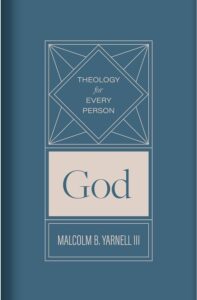- Home
- Spiritual Life
- Why Study God?

Why Study God?
 Excerpt taken from God: Theology for Every Person by Malcolm Yarnell.
Excerpt taken from God: Theology for Every Person by Malcolm Yarnell.
Chapter Two
Why Study God?
When people start doing theology, a question that often arises is, “Why should I study God?” My immediate answer typically points out how God’s love is so perfect that we are just drawn to his truth. But to answer this question more completely, let’s break it into two: First, why should I discover who God is? Second, why should I be concerned with what God does? The importance of understanding God and his actions will become clear as we survey who he is and what he is doing. But let’s begin with the second question since the shape of God’s activity provides the avenue for understanding the being of God. We know who God is through what God does. God’s actions will also provide the outline for the narrative of our grand tour.
Consider What God Does
We want theology, because knowing what God is doing brings us wondrous truth for our minds and blessed peace for our hearts. Three major acts in the divine economy show us the benefits of knowing him: First, let’s study God so we can better understand our Creator. Second, let’s study God because he loves us enough to reconcile us despite our failures. Third, let’s study God because he will one day show himself to us in his glorious beauty, and that is worth more than everything else.
Knowing Our Creator
The first major theologian of the Western tradition, Augustine of Hippo, believed theology comes instinctively to human beings. Our natural inclination to know God arises from a fundamental need planted in the human heart at creation. Augustine discovered our overwhelming desire. He described this desire in a prayer at the beginning of his moving spiritual autobiography, Confessions. The thought of God stirs a person, he said, “so deeply that he cannot be content unless he praises you.” Why do we have this deep desire? “Because you made us for yourself and our hearts find no peace until they rest in you.”
Augustine believed that God created us so that we might have an ongoing relationship with him. Our desperate need for the joy of that relationship inevitably draws every one of us to consider who God is and what he is doing. Humanity’s ultimate purpose is to know God, to love God, to glorify God. We are created to relate to God through praising him. The goal of creation is worshipful communion with God. Human beings did not just spontaneously come into existence on our own. We were created by an all-powerful God according to his design and for his purpose.
Experiencing God’s Love
While Augustine answers our question with reference to creation, Moses and Jesus Christ answer by pointing to the greatest commandment of God. Moses delivered it to Israel as a summary of God’s entire will for the people. After rehearsing the gift of the covenant and the Ten Commandments, Moses revealed “the command” above all commands (Deut. 6:1). This command was known among the Israelites by its first word, Shema [pronounced shuh-mah], which means, “Listen!” Recognizing its central claim on their hearts, the Israelites incorporated the Shema into their daily prayers:
“Listen, Israel: The Lord our God, the Lord is one. Love the Lord your God with all your heart, with all your soul, and with all your strength.” (Deut. 6:4–5)
This high and summative command, known by many as the Great Commandment, has both depth and simplicity. On the one hand, there is simplicity: The Lord is one, so his people must be devoted to him alone. On the other hand, there is depth: The devotion Israel should have for God is described as “love.” This love must be conducted with one’s whole heart, with one’s whole soul, and with one’s whole strength.
The simplicity and depth in the Great Commandment are also conveyed in the very term used for love. There were two major terms for love in the Hebrew Bible. The first, Ahabah [pronounced ah-ha-vah], describes the love that God initiates. Ahabah is God’s electing love. The second Hebrew term, Chesed [pronounced khe-sed], concerns the continuing and faithful love of God. Chesed is God’s covenantal love. Because God is one, or simple, he does not have two radically different loves. Rather, his love is so great that it has multiple dimensions from our limited perspective. When you survey the biblical descriptions of God as merciful, gracious, and so on, it becomes clear how magnificent the love of God is.
In an interesting twist, the Shema commanded Israel to love God with Ahabah, electing love. This should cause you to pause and ask, If God is the One who initiates love, how can we as human beings love God with Ahabah? Because we are mere creatures and remain entirely dependent upon God for everything, we are never able to initiate something toward God. Instead, our love for God will always remain a responding love. As the apostle John wrote, “We love because he first loved us” (1 John 4:19). God grants us the ability to love, but this ability does not depend on our own power. Our hearts must receive the initiating love of God and reflect it back to him.
With the origin of love grounded in God, we must now consider a related question: What should characterize our human-responsive love for God? The Shema says we must love God with every aspect of our lives and with the entirety of every aspect of ourselves. Moses wrote that each of us must love God in three ways, with the heart, with the soul, and with the strength. Moses also said loving God requires one’s entire heart, one’s entire soul, and one’s entire strength. In other words, we must love God totally.
Jesus, the Messiah who fulfilled the prophecies of Moses, reminded his listeners about Moses’s command to love God. He agreed that loving God is, among all the commandments of God, “the most important” (Mark 12:29). However, Jesus added a requirement that incorporated the mental focus of the Greek world in which Israel now lived. Not only must you love the Lord our God with all your heart, soul, and strength. Jesus also commands you to love God “with all your mind” too (Mark 12:30). Jesus clarified for us the prophecy given to Moses.
Jesus Christ commanded everyone to love God with everything we are and with everything we can do. We must love God with the affections of our imaginations; he must be the desire of our “heart.” We must love God with the directing choices of our wills; he must be the delight of our “soul.” We must love God with every aspect of our existence; he must be the origin and end of our “strength.” Such all-engrossing love necessarily also includes loving God with your intellectual ability to abstract truth, with the gift of your “mind.” You have a mind because you were also made in the image of the Logos (Mark 12:30).
Loving God with your mind can never happen apart from loving God with every other aspect of your humanity. Jesus also made this clear. Of the major terms for the mind, Jesus uses one that indicates the movement not merely of the abstract intellect but of the whole human character. The Greek word, dianoia, considered the entire process of human contemplation of God. In other words, every aspect of your being must be focused on knowing, loving, and glorifying God. This includes exercising your intellect as well as your will and your emotions.
Seeing God’s Glory
So, we do theology because, first, God originally created us and, second, because God lovingly commanded us to love him with all our mind. Third, moreover, we must engage in theology because our final goal includes the awesome privilege of experiencing God in his glory. In short, we should do theology by reason of his creating, his commanding, and his glory.
Augustine alluded to the third reason in his statement, “our hearts find no peace until they rest in you.” An avid Bible reader, commentator, and preacher, the bishop of Hippo (a city in northern Africa), borrowed this idea of resting in God from the biblical canon. The fourth chapter of the letter to the Hebrews repeatedly commands the reader to “enter the rest” offered by God.
Herschel Hobbs, a leading Southern Baptist pastor theologian of the mid-twentieth century, noted the idea of “rest” in Hebrews looks back to God’s sabbath rest at the conclusion of creation (Gen. 2:2; Heb. 4:4). To “enter the rest” also refers to Israel inhabiting the land that God promised to them. But most importantly, it refers to experiencing the final rest of God’s glory. “This eschatological thought is an ultimate meaning.”
The New Testament scholar A.T. Robertson says our final rest will involve “not cessation of work, but rather of the weariness and pain in toil.” More importantly, we will have entire “harmony” with God. To a great extent, the final rest can be experienced even now, as our rebellious wills are brought by spiritual conversion into harmony with God’s will.
We must study theology because God created us for it, because God loves us and commands us to love him in response, and because our hearts will find perfect rest only in him.
…
Order your copy of God: Theology for Every Person by Malcolm Yarnell.
Trending Now
Sign up today for your Inspiration Today Daily Newsletter
Supercharge your faith and ignite your spirit. Find hope in God’s word. Receive your Inspiration Today newsletter now!
Malcolm Yarnell
Malcolm Yarnell serves the churches of the Southern Baptist
Convention as Research Professor of Theology at the Southwestern
Baptist Theological Seminary, as Managing Editor of the Southwestern
Journal of Theology, and as a Member of the SBC Resolutions
Committee. He also serves the Lakeside Baptist Church in Granbury,
Texas as Teaching Pastor and is a Member of the Commission on
Baptist Doctrine and Christian Unity with the Baptist World Alliance. Learn more at malcolmyarnell.com
Related Articles
February 26, 2026
Chased by God’s Blessings—How to Attract God’s Blessings and Walk in His Favor
The key to God’s amazing turnaround plan for you to walk in His favor in every area of life. Have…
February 25, 2026
Finish Strong with a Kingdom Mindset
For if you keep silent at this time, relief and deliverance will rise for the Jews from another…
February 23, 2026
The Joy of Being His Workmanship
When life urges us to strive harder and do more, Scripture invites us to rest in a freeing truth:…
February 20, 2026
Stepping Out in Faith When God Calls You to the Impossible
Stepping out in faith often feels uncomfortable—especially when God calls you toward something that…
Next Steps To Strengthen Your Walk
Inspiration Today Newsletter
Supercharge your faith and ignite your spirit. Find hope in God’s word. Receive your Inspiration Today newsletter now!
Christian Articles
Find articles to strengthen your walk and grow your faith. We have a wide range of topics and authors for you.
Submit A Prayer Request
We are here for you. Simply click on the button below to reach us by form, email or phone. Together we will lift our hearts and voices with you in prayer.





